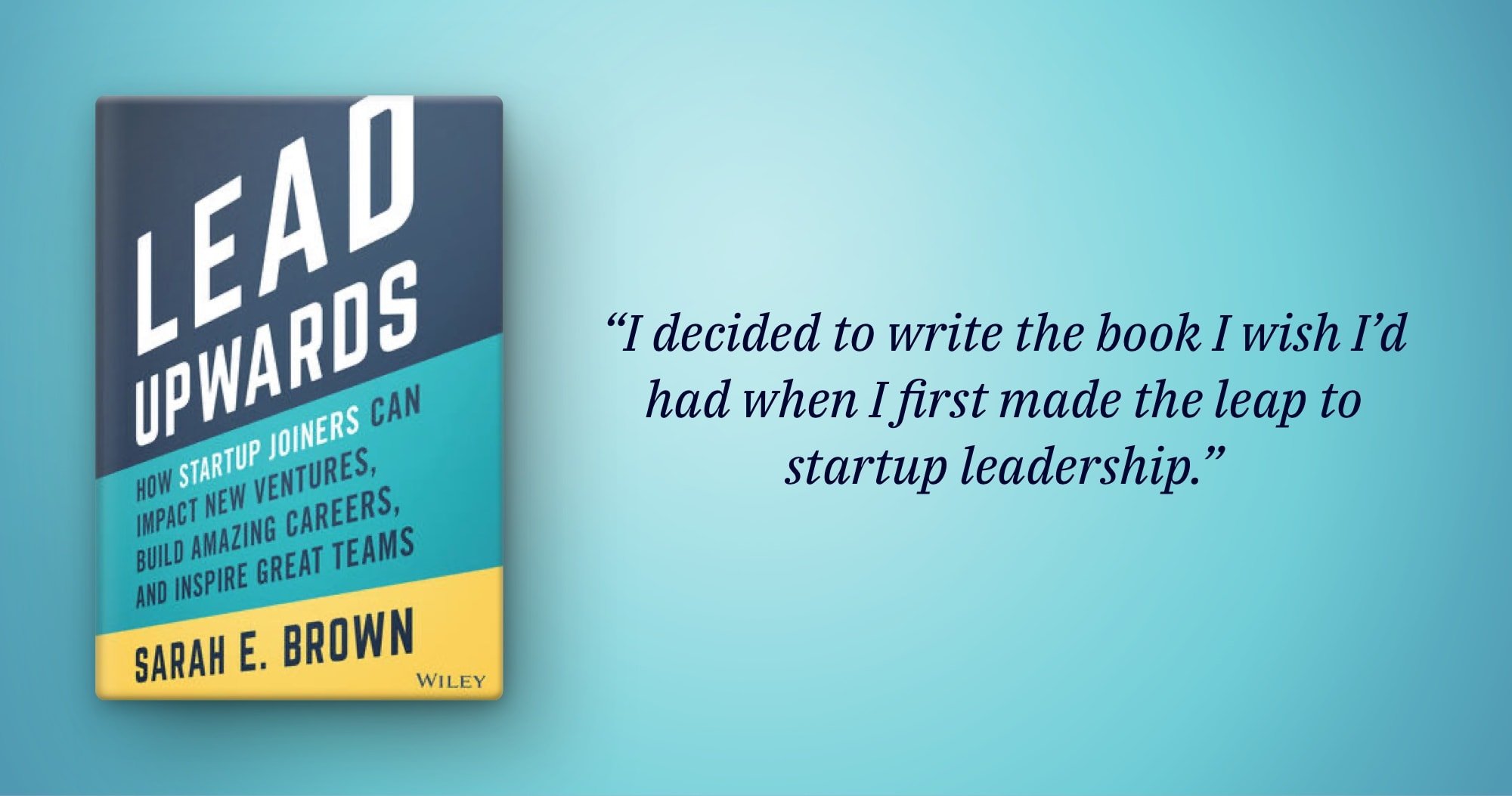How to Level Up Into a Startup Leadership Role
The internet is brimming with advice for would-be startup founders. If you want to build a company and need to get oriented, you can read Paul Graham’s essays, lurk on Hacker News, peruse Stripe Atlas, listen to Patrick O’Shaughnessy’s podcasts, and fill your shelves with books like Venture Deals, The Hard Thing About Hard Things, and The Minimalist Entrepreneur. There are so many resources available to aspiring entrepreneurs that it’s hard to find the signal in the noise.
Oddly, there are relatively few equivalent resources out there for early employees. This is surprising given that startups are team efforts, and how frequently founders and investors point to people as the engine of their success.
Joining a startup is hard. Working in an organization that’s growing fast is disorienting: new people are coming on board and trying to figure things out, and the minute you think you have things figured out, the rules change because the company has doubled in size yet again. Whenever you encounter a new problem in engineering, product, marketing, or any other domain, you constantly need to take the initiative, not just by generating ideas for potential solutions, but by generating ideas and putting those solutions into action. Startups aren’t steady state organizations. They thrive on growth. So succeeding as an early employee requires scaling your impact, and that requires scaling your team. If you feel out of your depth, then you’re doing things right, which is why growing fast requires uncommon patience with yourself and your colleagues. You need to give away your Legos, work at 2x, and become relentlessly resourceful. Ultimately, when you join a startup, you’re taking a risk by investing your time and skills into building something new, and the impact you can make is commensurately significant.
The inherent difficulty of excelling as an early employee paired with the limited resources available to those who take on the challenge inspired Sarah E. Brown to write Lead Upwards, her field guide to joining a fast-growing technology business and leveling up into a leadership role. We found her insights so useful that we bought copies for the entire Epistemix team, invited her to give an all-hands talk, and, in the spirit of sharing what we learn, interviewed her about the key lessons she’s learned on the way to building a career as a startup executive.
May her ideas aid you on your journey as they have us on ours.

What is the Lead Upwards origin story? How did it go from the first glimmer of an idea to the book I’m holding in my hands right now?
After publishing my first book, Power to the Startup People, which focused on how to begin your startup employee journey, the most common feedback I heard from readers was that they wanted a book that discussed startup leadership and how to grow your startup leadership career. I became a startup executive through the help of a great executive coach and support from my CEO at the time. Not everyone can afford a coach, and the startup literature says very little about how to make this journey, so I decided to write the book I wish I’d had when I first made the leap to startup leadership.
How do early employees think differently than founders? What mindset best equips early employees to succeed?
The risk-reward calculation for startup employees is different. Founders who are “all in” on a startup also are “all in” on the rewards. Employees however may only see a fraction of the fruits of success, even in the best of exit scenarios.
That being said, being an early employee can be tremendously gratifying, even if not financially (although sometimes it can be… it’s not necessarily as common, however). What works when your company is 10 people and < $1 million in ARR won’t work at 200 people and $100 million in ARR (and beyond).
As a company grows, specialists and experts come in to build up the business, and that can be a hard transition for many early joiners who are used to wearing all of the hats and having a lot of room to experiment. Being willing to grow your leadership skills in key ways and take more ownership is crucial if you want to grow your startup leadership journey. This book hopefully helps demystify what’s required if you want to scale up with your startup, and how to think about the risk-reward calculation to empower employees to build the best careers possible with a clear understanding of their risks vs. rewards in any startup job.
If you could go back in time and give yourself a piece of advice when you joined your first startup, what would it be?
Appreciate the journey and stay present. Things change so quickly in startups, if you don’t take some time to smell the roses while they’re growing, you’ll miss a lot of the fun. Also, spend more time with customers; they are an endless source of wisdom and inspiration during tough times.
As you’ve grown into the leader you are today, what has surprised you most about the art of building a company? What unexpected signals turned out to be especially important?
It’s all about the people. Relationships are the key thing to optimize for—they come before any product or service or technology. Often we think that if we just “do the work” we’ll be successful, but building relationships with peers, our bosses, our founders, and/or our board is paramount to getting work done successfully. We talk a lot about how to build relationships with different stakeholders in the book, and I hope people find this to be helpful in their own journeys.
As data science becomes a pivotal function in technology companies, more and more data scientists are being recruited from… science! For example, our small team includes researchers with PhDs from fields as diverse as astrophysics, microbiology, computer science, epidemiology, and public health. How should ambitious young people prepare to make the jump from academia to startups?
I come from a family of academics—both of my parents were academics as were my maternal grandparents—but I’ve never personally made the leap from academia to startups, as I went right into the industry after undergrad. From talking to friends who have done this, a challenge they’ve faced is realizing startups don’t operate like the Academy and struggling with some of the cultural aspects. I’d suggest anyone making the leap reach out to others who’ve done the transition. We have a section in the book geared toward helping “big company” people make the transition to startups. Some startups with more ex- or current academics likely have different cultures than others where one PhD is brought in to be the expert, so I’d also advise finding out what kind of environment someone is stepping into as part of assessing startup fit prior to joining.
What common problems do startups with 20-50 employees encounter? What should we be thinking about as we navigate this particular stage of growth?
Moving from generalists to specialists across the organization tends to happen at this stage, and this can be jarring for early employees used to doing everything. A lot of the processes break at this stage—maybe at 20 people invoices were approved by emailing them to the CEO, and now you have to submit invoices to a dedicated finance person to be approved by a manager, slowing things down. Decisions that could be made by individual contributors now need approval by a manager or a manager’s manager, and proving ROI of each program becomes much more relevant as you grow and investors are brought on who expect a return. Maybe at 20 people you used to have all-hands around a conference table (or virtual zoom with everyone’s faces fitting in the screen) and now you’ve got an all hands so big you don’t know everyone’s name, and suddenly that feels less intimate. The culture feels different when you are successful because there’s much more lost in translation. You have to document much more because historical knowledge can get lost as you grow, and expect that the small group of folks shaking things up is going to shift into a larger group of folks who have to be really intentional about how they work and how decisions are made if they want to succeed together.
What did writing Lead Upwards teach you about creativity, communication, and leadership? What has publishing the book taught you about culture building?
I wrote this book mostly alone in my condo in Boulder during the early stages of the pandemic. It was a lonely, uncertain, scary time, and the book allowed me to interview almost 50 people I admired about their startup leadership journeys and served as a beacon of hope for me that I could create something useful that would connect me to the broader startup community. As a woman and member of the LGBTQ+ community, I’ve felt like an “other” in many startups, and as I grow into more leadership roles, I’m often the “only”. Helping people feel less alone (including myself) has been the greatest gift of the book journey so far and I can’t wait to connect with more people for whom this topic resonates.
What should fans of Lead Upwards read next? What outside-the-box resources can you recommend for early employees looking to advance their careers and contribute to their company’s success
I suggest startup fans read more sci-fi, like Eliot Peper’s work. Jane McGonical’s new book Imaginable is awesome and helps us think about how to see the future coming and feel ready for anything, including things that seem impossible today (a great startup skill for our current uncertain economic and global climate). I’m also reading the second edition of Startup Boards by Brad Feld, Matt Blumberg, and Mahendra Ramsinghani. I also love Tara Brach’s Trusting the Gold to help people find equanimity amidst the ever-volatile startup environment.

